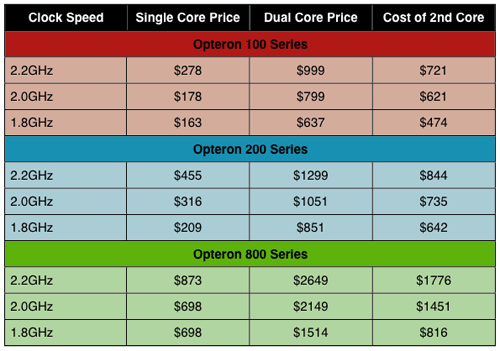AMD's dual core Opteron & Athlon 64 X2 - Server/Desktop Performance Preview
by Anand Lal Shimpi, Jason Clark & Ross Whitehead on April 21, 2005 9:25 AM EST- Posted in
- CPUs
The Lineup - Opteron x75
Prior to the dual core frenzy, multiprocessor servers and workstations were referred to by the number of processors that they had. A two-processor workstation would be called a 2-way workstation, and a four-processor server would be called a 4-way server.Both AMD and Intel sell their server/workstation CPUs not only according to performance characteristics (clock speed, cache size, FSB frequency), but also according to the types of systems for which they were designed. For example, the Opteron 252 and Opteron 852 both run at 2.6GHz, but the 252 is for use in up to 2-way configurations, while the 852 is certified for use in 4- and 8-way configurations. The two chips are identical; it's just that one has been run through additional validation and costs a lot more. As you may remember, the first digit in the Opteron's model number denotes the sorts of configurations for which the CPU is validated. So, the 100 series is uniprocessor only, the 200 series works in up to 2-way configurations and the 800 series is certified for 4+ way configurations.
AMD's dual core server/workstation CPUs will still carry the Opteron brand, but they will feature higher model numbers; and while single core Opterons increased in model numbers by 2 points for each increase in clock speed, dual core Opterons will increase by 5s. With each "processor" being dual core, AMD will start referring to their Opterons by the number of sockets for which they are designed. For example, the Opteron 100 series will be designed for use in 1-socket systems, the Opteron 200 series will be designed for use in up to 2-socket systems and the Opteron 800 series will be designed for use in 4 or more socket systems.
There are three new members of the Opteron family - all dual core CPUs: the Opteron x65, Opteron x70 and Opteron x75.

- The fastest dual core runs at 2.2GHz, two speed grades lower than the fastest single core CPU - not too shabby at all.
- The slowest dual core CPU is priced at the same level as the fastest single core CPU; in this case, $637.
- Unlike Intel, AMD's second core comes at a much higher price. Take a look at the 148 vs. 175. Both run at 2.2GHz, but the dual core chip is over 3.5x the price of the single core CPU.


While AMD will undoubtedly hate the comparison below, it's an interesting one nonetheless. How much are you paying for that second core on these new dual core Opterons? To find out, let's compare prices on a clock for clock basis:











144 Comments
View All Comments
StrangerGuy - Thursday, April 21, 2005 - link
I find it strange why AMD did not release <2.2GHz A64 X2s? Maybe due to manufacturing issues?LX - Thursday, April 21, 2005 - link
How will the bandwidth limited X2 be affected by overclocking?Chunkee - Thursday, April 21, 2005 - link
Nicely done. The price will be a factor as usual. Does the performance gain justify the cost? For the enthusiast yes, but I will wait a bit. My 754 setup with a raptor still rocks plenty enough for me. The technology improvements are great. I will always be a big AMD Fan.jC
linkgoron - Thursday, April 21, 2005 - link
not bad... but AMD should make <500$ athlon 64 X2 CPUS